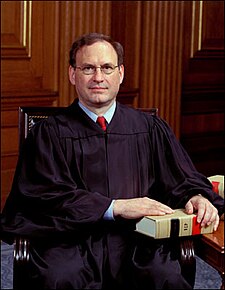Samuel Alito: Difference between revisions
Pat Palmer (talk | contribs) Tag: Manual revert |
Pat Palmer (talk | contribs) (adding an image) |
||
| Line 1: | Line 1: | ||
{{subpages}} | {{subpages}} | ||
'''Samuel Alito''' (1950- ) is an [[United States of America|American]] jurist who | {{Image|Justice Alito official.jpg|right|225px|Justice Alito in 2006.}} | ||
'''Samuel Alito''' (1950- ) is an [[United States of America|American]] jurist who has served as a justice on the U.S. Supreme Court since January 31, 2006. He was nominated to the post by President [[George W. Bush]]. Prior to that, Alito was a judge on the [[United States Court of Appeals for the Third Circuit]]. | |||
His judicial philosophy leans [[American conservatism|conservative]] and resembles the philosophy of his colleague [[Antonin Scalia]]. His nomination was notably contentious and the [[Democratic Party]] threatened to use a [[filibuster]] to block his confirmation. After he joined the court, as predicted, the court veered significantly to the right and often handed down 5-4 decisions favoring conservative positions, notably ''[[Gonzales v. Carhart]]'' that upheld the ban on partial birth abortion, ''[[Morse v. Frederick]]'' that limited the right of free speech in schools, and two cases (''Meredith v. Jefferson County Board of Education'' and ''Parents v. Seattle'') that invalidated local school [[desegregation]] programs. | His judicial philosophy leans [[American conservatism|conservative]] and resembles the philosophy of his colleague [[Antonin Scalia]]. His nomination was notably contentious and the [[Democratic Party]] threatened to use a [[filibuster]] to block his confirmation. After he joined the court, as predicted, the court veered significantly to the right and often handed down 5-4 decisions favoring conservative positions, notably ''[[Gonzales v. Carhart]]'' that upheld the ban on partial birth abortion, ''[[Morse v. Frederick]]'' that limited the right of free speech in schools, and two cases (''Meredith v. Jefferson County Board of Education'' and ''Parents v. Seattle'') that invalidated local school [[desegregation]] programs. | ||
Revision as of 10:12, 25 August 2024
Samuel Alito (1950- ) is an American jurist who has served as a justice on the U.S. Supreme Court since January 31, 2006. He was nominated to the post by President George W. Bush. Prior to that, Alito was a judge on the United States Court of Appeals for the Third Circuit.
His judicial philosophy leans conservative and resembles the philosophy of his colleague Antonin Scalia. His nomination was notably contentious and the Democratic Party threatened to use a filibuster to block his confirmation. After he joined the court, as predicted, the court veered significantly to the right and often handed down 5-4 decisions favoring conservative positions, notably Gonzales v. Carhart that upheld the ban on partial birth abortion, Morse v. Frederick that limited the right of free speech in schools, and two cases (Meredith v. Jefferson County Board of Education and Parents v. Seattle) that invalidated local school desegregation programs.
He wrote the majority opinion in Citizens United v. Federal Election Commission, in which the Court upheld the right of corporations and to engage in free speech for political campaigns. This decision was criticized by President Barack Obama in the 2010 State of the Union Address, with Alito in the audience. News media have reported that Alito appeared to mouth "that's not true" in response.[1]
References
- ↑ Laurie Kellman (28 January 2010), "Justice looks askance as Obama criticizes court", Associated Press
